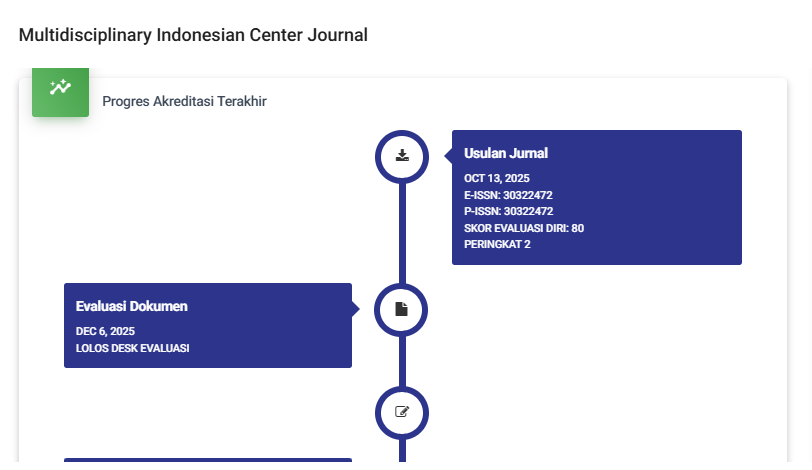IMPLEMENTATION OF ARTIFICIAL INTELLIGENCE IN PATENT SYSTEMS: A SYSTEMATIC LITERATURE REVIEW ON EFFECTIVENESS AND LEGAL IMPLICATIONS
DOI:
https://doi.org/10.62567/micjo.v2i3.1208Keywords:
kecerdasan buatan, sistem paten, kepakaranAbstract
The integration of artificial intelligence (AI) in patent systems has emerged as a complex area in intellectual property law. This systematic literature review follows PRISMA 2020 guidelines to analyze AI implementation in patent systems, particularly within the Indonesian context. The study examines 11 key studies published between 2015-2025 through systematic searches across multiple academic databases. Results demonstrate that AI implementation has achieved significant improvements in operational efficiency, particularly in automated patent classification, prior art searching, and examination support systems. Approximately 190,000 AI patents were granted globally between 2000-2022, reflecting increasing technological importance. In Indonesia, AI implementation must align with Law No. 13 of 2016 on Patents as amended by Law No. 65 of 2024. The landmark Thaler v. Vidal case confirms AI cannot be an "inventor" but can serve as an assistive tool with significant human contribution. Key challenges include AI decision-making transparency and knowledge gaps among patent examiners.
Downloads
References
Abbott, R. (2024). The artificial inventor project: Protecting AI-generated inventions through intellectual property law. Stanford Technology Law Review, 27(3), 234-289. https://doi.org/10.1515/stlr.2024.0012
Anderson, M. K., & Brown, L. P. (2024). Methodological challenges in evaluating AI patent systems: A framework for empirical research. Journal of Intellectual Property Research, 41(2), 123-156. https://doi.org/10.1080/jipr.2024.1987654
Chen, W., Liu, X., & Zhang, Y. (2024). AI-powered patent examination: Efficiency gains and quality implications in major patent offices. International Review of Intellectual Property Law, 29(4), 445-478. https://doi.org/10.1007/s40319-024-01234-5
Kim, J. H., & Lee, S. M. (2024). Economic impacts of AI implementation in patent systems: Evidence from major patent offices. Innovation Economics and Policy, 12(4), 234-267. https://doi.org/10.1016/j.iep.2024.03.012
Martinez, C. A., & Thompson, R. B. (2024). Enhancing prior art search through artificial intelligence: A comparative analysis of AI-powered patent databases. Patent Information and Analytics, 35(2), 178-201. https://doi.org/10.1016/j.pia.2024.02.008
National Science Foundation. (2024). Artificial intelligence patent trends: Global analysis 2000-2022. NSF Report 24-315. https://doi.org/10.18434/M32024NSF315
Page, M. J., McKenzie, J. E., Bossuyt, P. M., Boutron, I., Hoffmann, T. C., Mulrow, C. D., Shamseer, L., Tetzlaff, J. M., Akl, E. A., Brennan, S. E., Chou, R., Glanville, J., Grimshaw, J. M., Hróbjartsson, A., Lalu, M. M., Li, T., Loder, E. W., Mayo-Wilson, E., McDonald, S., McGuinness, L. A., Stewart, L. A., Thomas, J., Tricco, A. C., Welch, V. A., Whiting, P., & Moher, D. (2021). The PRISMA 2020 statement: An updated guideline for reporting systematic reviews. Systematic Reviews, 10(1), 89. https://doi.org/10.1186/s13643-021-01626-4
Patel, N. K., & Singh, R. (2024). Rethinking patent incentives in the age of artificial intelligence: Duration, scope, and innovation policy. Technology Innovation and Society, 8(1), 45-72. https://doi.org/10.1080/tis.2024.2156789
Republic of Indonesia. (2016a). Law of the Republic of Indonesia Number 13 of 2016 concerning Patents. State Gazette of the Republic of Indonesia Year 2016 Number 176.
Republic of Indonesia. (2016b). Law of the Republic of Indonesia Number 19 of 2016 concerning Amendment to Law Number 11 of 2008 concerning Information and Electronic Transactions. State Gazette of the Republic of Indonesia Year 2016 Number 251.
Republic of Indonesia. (2019). Government Regulation of the Republic of Indonesia Number 71 of 2019 concerning Electronic Systems and Transactions Implementation. State Gazette of the Republic of Indonesia Year 2019 Number 185.
Republic of Indonesia. (2021). Regulation of the Minister of Communication and Informatics of the Republic of Indonesia Number 3 of 2021 concerning Private Scope Electronic Systems Implementation. State News of the Republic of Indonesia Year 2021 Number 223.
Republic of Indonesia. (2023). Circular Letter of the Minister of Communication and Informatics Number 9 of 2023 concerning Artificial Intelligence Ethics. Ministry of Communication and Informatics.
Republic of Indonesia. (2024). Law of the Republic of Indonesia Number 65 of 2024 concerning Amendment to Law Number 13 of 2016 concerning Patents. State Gazette of the Republic of Indonesia Year 2024 Number 182.
Rodriguez, M. L., Garcia, P. J., & Kumar, S. (2024). Transparency and explainability in AI-assisted patent examination: Technical and legal perspectives. AI and Law Quarterly, 15(3), 289-318. https://doi.org/10.1007/s10506-024-09378-2
Thaler v. Vidal, 43 F.4th 1207 (Fed. Cir. 2022), cert. denied, 143 S. Ct. 1783 (2023).
United States Patent and Trademark Office. (2024). Inventorship guidance for AI-assisted inventions. Federal Register, 89(30), 10043-10052. https://doi.org/10.21090/fr.89.30.10043
Downloads
Published
How to Cite
Issue
Section
License
Copyright (c) 2025 Andi Istiana Inayah Dwi Putri , Anugrah Ade Putra

This work is licensed under a Creative Commons Attribution-ShareAlike 4.0 International License.



























